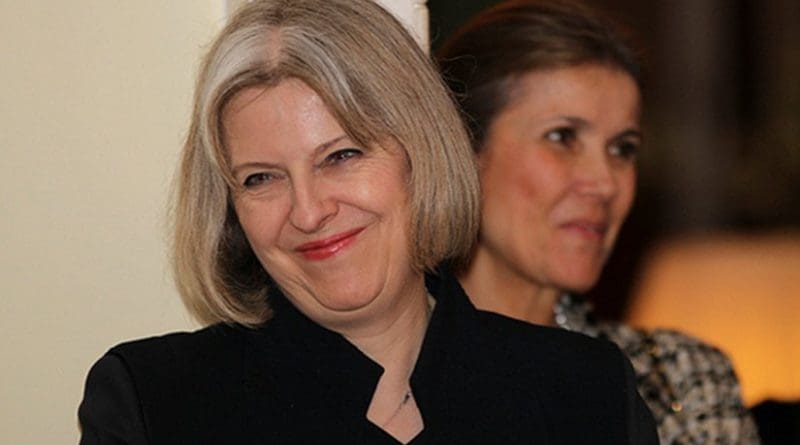Theresa May In India: Out Of Touch With Reality – Analysis
By IPCS
By Harry Roberts*
Ostensibly, British Prime Minister Theresa May’s India visit is about showcasing Britain’s economic potential in a post-Brexit world. That she would make India her first destination outside on the EU since assuming office is unsurprising, given that India is the world’s fastest growing major economy and it is hoped that Britain plc can tap into its success. Furthermore, her speech at the India-UK Tech Summit was used specifically to advertise Britain’s ‘innovative’ skills and technological know-how to the burgeoning Indian market. However, her government’s pledge to limit immigration effectively means that there is only a limited possibility that British economic interests stand to gain from such a visit. Essentially, the UK is providing too few incentives for India on the immigration and visa issue to drastically change its economic relationship with the UK.
This trip is primarily about the UK government seeking areas in which India and the UK can open access to each other’s companies. While the UK cannot begin any Free Trade talks before it triggers Article 50 of the Lisbon Treaty, it is keen to get informal trade talks underway with major non-EU states including India. In her speech at the Summit, May declared that she wants to “unleash” Britain’s “world-leading services sector to operate in the Indian market – benefitting India and the UK alike… This does not need to wait for us to leave the EU.”
However, there is at least one problem with this. According to Sir Thomas Harris – who ran the UK India Business Council for many years – during the Free Trade Agreements (FTA) negotiations between the EU and India, New Delhi consistently resisted lifting restrictions on professional services including accounting, insurance, banking and legal services. These are the very sectors that Britain is keen on exporting to India and May did not explain why she thinks Britain will have more luck with India than the EU did a few years ago.
However, apart from Britain’s reduced negotiating power post-Brexit, it is May’s uncompromising stance on immigration to the UK that is the biggest sticking point in building stronger trade relations with India. The UK Home Office’s poorly timed announcement only a few days before the visit that companies wishing to move employees to the UK would face a higher salary threshold is effectively aimed at limiting Indian migration to the UK and making it harder for Indian graduates to find work on leaving UK-based universities.
The unbending approach to Indian immigration is all the more disappointing coming on the back of Brexit and a reduced economic outlook for Britain. One would think that the UK government would come to India with more incentives for the Indians. However, the best May could do was hint at smoothening the UK visa application process for Indian citizens if Modi would help send home Indian nationals who were staying illegally in the UK. Modi can do no more towards this than the British government can to induce Britons who have overstayed their Australian visas to return to the UK.
The inherent contradiction in the UK’s current approach is that if Britain wants more trade and greater access to the Indian market, it will have to accept more Indian workers, which would make a mockery of the May government’s policy of limiting immigration – the very raison d’être for her appointment as leader by the Conservative Party. Manoj Ladwa, a former advisor to Modi, summed up the ethos of the UK approach to India as “we want your business but we don’t want your people.” India can go anywhere for investment and will be tempted to overlook the UK as a partner if such a stance on Indian immigration remains. As it stands, Germany, a country which is a leader in innovative technology, exports around three times the amount to India than the UK, and has a much more accommodating stance towards Indian immigration than the UK currently has.
May’s visit will perhaps lead to a few business deals and joint declarations on security cooperation but is unlikely to yield a long-term and (for the UK) much needed boost in the UK-India trade relationship. The timing suggests that her visit is not much more than a much-needed PR stunt for her government and lacks any real substance. Furthermore, her visit was in fact preponed from December 2016 at the request of the UK government. Amid fears of a post-Brexit economic crash, May’s visit is aimed at restoring confidence in British markets by showcasing the viability of Britain’s long-term economic prospects.
According to the BBC’s Justin Rowlatt, a top but unnamed Indian diplomat put it that May’s visit is “an afterthought…This is about politics in the UK, not about what we want.” The inherent contradiction that Britain now faces in trying to limit immigration while simultaneously seeking a greater share of non-EU world trade will handicap Britain’s post-Brexit ambitions to forge a “new global role” for itself. More importantly, May’s visit to India could set a precedent for Britain’s future trade-relationships with other major economic powers and even emerging ones in a post-Brexit world by highlighting Britain’s weak-hand at the negotiating table.
After her India visit, the May government might finally realise that doing business in a globalised world while restricting free movement of people will be more difficult carry out than they had anticipated, highlighting just how out of touch her party really is with reality.
* Harry Roberts
Research Intern, IPCS

